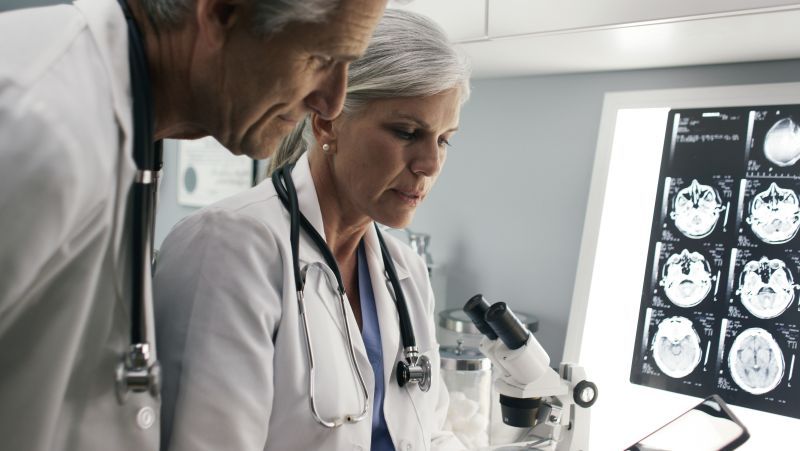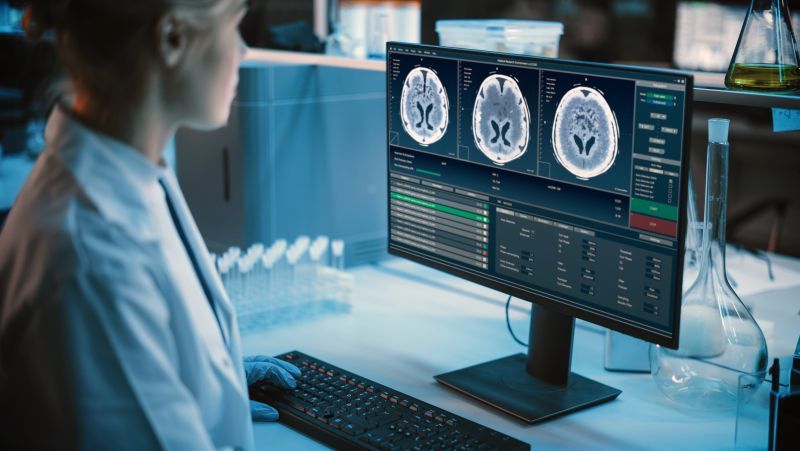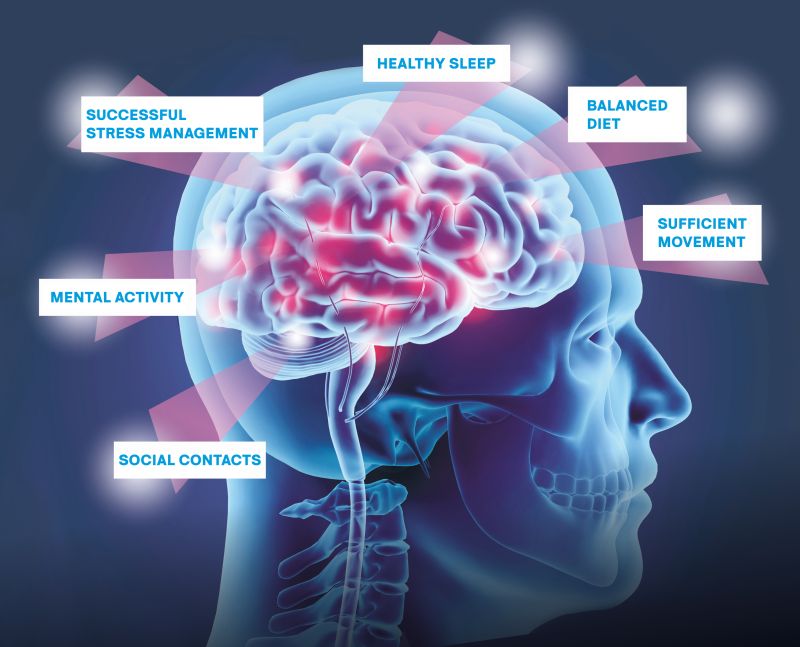DEMENTIA CAN AFFECT ANYBODY

Facts
There are currently around 153'000 people living with dementia in Switzerland. Alzheimer's disease is the most common form of dementia. The older you are, the more likely you are to be diagnosed with dementia. With life expectancy on the rise around the globe, the number of people affected by dementia is expected to rise sharply. According to current estimates, the number of people living with dementia will more than double over the next 30 years if we do nothing to counter this development.
NEURODEGENERATIVE DISEASES – Pathology

The collective term ‘neurodegenerative diseases’ refers to a group of disorders characterised by progressive damage and loss of neurons in the human brain.
Generally, the body is not able to replace damaged or dead neurons, which can lead to a declining intellectual capacity or movement disorders.
Alzheimer's disease is the most common neurogenerative disease. Other disorders include frontotemporal dementia, Lewy body dementia, Parkinson's, vascular dementia and prion diseases.
Alzheimer's disease is named after the clinical psychiatrist and neuroanatomist Alois Alzheimer, who first described the condition in 1906. Deposits in the form of plaque and tau fibril build-up in the brain are characteristic of Alzheimer’s disease. The extent to which these deposits are responsible for the progressive loss of neurons and synapses within the brains of Alzheimer’s patients remains to be clarified. The loss of synapses and neurons leads to the progressive break down of important mental functions such as memory, language, planning, actions and spatial orientation. Age is the biggest risk factor for Alzheimer’s. Around 20 to 25% of people over 85 years of age are affected by Alzheimer’s disease.
Frontotemporal dementia (FTD) is a rare type of dementia most often diagnosed in people aged 50-60. Frontotemporal dementia primarily causes neurons in the brain's frontal and temporal lobes to die. These areas of the brain are responsible for controlling emotions, social behaviour and other aspects. People with FTD may experience changes in their personality and the way they interact with others. As a result, it can become increasingly difficult for people living with FTD to adhere to social norms and behave appropriately. Apathy, irritability, tactlessness and social disinhibition are characteristic symptoms of FTD. Some patients experience severe speech disorders. An increase in memory loss only becomes more noticeable in the later stages of the disease.
Lewy body dementia (LBD) is a neurodegenerative disease triggered by the presence of characteristic inclusions in brain neurons. Otherwise known as Lewy bodies, these proteins can also be found in the brains of people diagnosed with Parkinson's, though in another part of the brain.
LBD causes a progressive decline in mental abilities, usually starting with difficulties with orientation, organisational abilities and adaptive capacity. Mental abilities can vary significantly. Other symptoms include optical hallucinations, movement disorders with altered gait, trouble sleeping and psychological disorders. Symptoms of this incurable disease typically first occur over the age of 60 and are similar to those exhibited by people with Parkinson’s. However, with LBD, dementia symptoms appear before movement disorders.
Parkinson's disease is named after the English doctor James Parkinson, who was the first to describe the symptoms of this disease in great detail in 1817. Parkinson's disease is primarily characterized by slowed and weakened movements, stiffness of certain muscles and, in some cases, trembling hands and feet. It also involves psychological symptoms, such as disrupted sleep-wake cycles. Parkinson’s disease is marked by the cell death of dopamine-producing neurons in the brain. The resulting lack of dopamine leads to movement disorders. The cause of Parkinson’s disease remains unknown. An estimated 15,000 men and women in Switzerland are affected by Parkinson's disease. Due to the duration of Parkinson’s disease and the relatively young age of the patients, the disease is becoming increasingly prevalent.
Vascular dementia is the second most common type of dementia. It is caused by insufficient blood flow in the brain, resulting in cell death of neurons. Impaired blood supply is often the result of a stroke, or several small strokes, which can often go unnoticed. Other conditions such as the narrowing of capillaries in the brain can also prevent sufficient blood supply to brain cells.
Symptoms can occur suddenly or gradually over time and often vary significantly depending on the location of the damage in the brain. The most common symptoms include loss of language skills, slowness of thought, difficulties planning and performing actions along with difficulty walking, changes to personality and mood swings. Memory loss is not always observed at the onset of symptoms.
Vascular dementia most commonly affects people in old age and may also present itself as a mixed dementia with symptoms of both Alzheimer's and vascular dementia.
Amyotrophic lateral sclerosis (ALS), the causes of which are unknown – with the exception of the rare, hereditary form –, is characterised by the progressive degeneration of motor neurons in the brain and spinal cord responsible for muscle movements. This leads to irreversible muscle paralysis all over the body, eventually spreading to the respiratory muscles. ALS is not related to MS (multiple sclerosis). Each year, 1 or 2 people in every 100,000 are diagnosed with ALS. The disease usually first appears in patients between 50 and 70 years old. Currently, there is no effective treatment known to halt or reverse the disease, which has an average survival time of three to five years after diagnosis.
Prion diseases are fatal neurodegenerative disorders that cause the brain to become sponge-like due to the degradation of neurons. Nowadays, the pathogens are considered to be misfolded proteins, i.e. prions. Unlike viruses, bacteria and fungi, these do not contain any genetic material. In humans, prion diseases can either be genetic, sporadic or transmissible. The new variant Creutzfeldt-Jakob disease was most probably caused by beef infected with BSE (mad cow disease). There have been no cases of Creutzfeldt-Jakob disease in Switzerland to date.
Diagnosis & treatment
Symptoms
Misplacing your keys or forgetting to buy milk aren’t necessarily signs of dementia. However, if you experience any of the following symptoms, it may be a good idea to visit your GP:
- Forgetfulness
- Difficulties planning and problem-solving
- Issues managing routine tasks
- Trouble finding words
- Orientation issues
- Misplacing items
- Perceptual disorders
The earlier dementia is diagnosed, the higher the likelihood that symptoms can be stabilised.

First contact: Your GP
Your GP will discuss your symptoms with you to get the full picture. A physical examination and lab tests can help exclude other potential causes behind the symptoms you're experiencing.
GPs can use psychometric tests to record symptoms and behavioural changes, and to distinguish between normal age-related memory disorders and the onset of a dementia disease. Common methods include the Clock Test and the Mini Mental State Examination.
If the test results indicate a dementia disease, your GP will refer you to a specialist or Memory Clinic for an exact diagnosis.

Your appointment with a specialist
Neuropsychological tests provide information on the disease. Imaging procedures such as computer tomography (CT), magnetic resonance imaging (MRI) or the highly complex positron emission tomography (PET) provide the specialist with more insight into the type of dementia you have.
Nowadays, cerebrospinal fluid examinations are also used to detect changes in the cerebrospinal fluid at the early stage of the disease.
We support research that helps scientists develop new diagnostic procedures for early detection.

Treatment for people diagnosed with Alzheimer’s
As things currently stand, there is no cure for Alzheimer's. However, Alzheimer’s medications can help delay progression of the disease and ease the side effects.
There are currently two types of medication available with a prescription: acetylcholinesterase inhibitors for mild to moderate Alzheimer’s disease, and memantine for moderately severe to severe cases.
Depending on the stage of the disease, it is also beneficial to improve the daily living skills of Alzheimer patients and stimulate their ability to think and remember. A number of treatment options such as cognitive training, physiotherapy or music therapy can help with this. They can improve the well-being of people diagnosed with Alzheimer's.
Risk factors

Age is the biggest risk factor for Alzheimer's, followed by genetic predisposition. We have no influence on either of these risk factors.
Other things that may put certain people at a higher risk of being diagnosed with Alzheimer's include:
- Cardiovascular risk factors such as being overweight and having high blood pressure
- Cardiac arrhythmia, high cholesterol
- Diabetes
- Severe head injuries
- Depression and chronic stress
- Lack of sleep
Infographic with prevention tips

You can reduce your risk of developing Alzheimer’s by leading a healthy life. It’s never too late to start!
- Avoid smoking and excessive drinking
- Keep an eye on your weight and maintain a balanced, vegetable-rich diet
- Incorporate exercise into your daily routine
- Stay mentally fit. A higher level of mental activity can reduce your risk
- Maintain social ties
- Improve your ability to handle stress and avoid things that trigger stress
